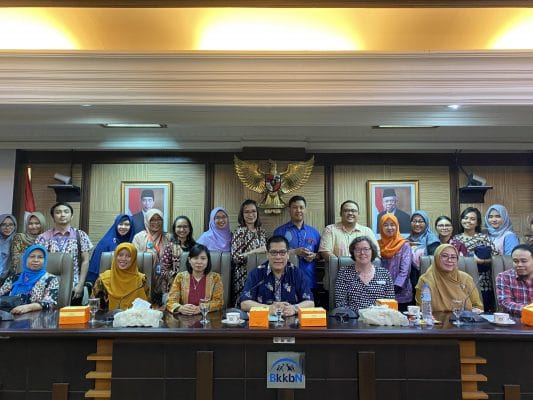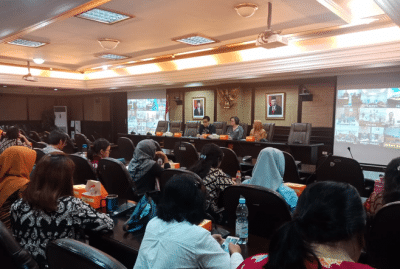
Sharing session on how to get Australian Awards Scholarships (AAS)
On Friday, February 14th February 2020, The Center for International Training and Collaboration held a sharing session on how to get Australian Awards Scholarships (AAS). The participants of this event were the employees of BKKBN in the central office as well as at the BKKBN Provincial Representative Offices. This session was attended by the Deputy for Training, Research, and Development of BKKBN, the Deputy Director of International Training, and the Flinders International Engagement Officer, Ms. Odile, who was the resource person in this event. There were several highlighted points in this sharing-session such as the basic information of AAS, several questions in the online application, and tips on how answering those questions.

Related to the basic information of AAS, Ms. Odile mentioned that the allocation of AAS is 85% of the quota for Master’s program and 15% for PhD program. This scholarship targets candidates coming from geographical focus areas such as Aceh, Nusa Tenggara Timur, Nusa Tenggara Barat, Papua, West Papua, Maluku and North Maluku. AAS also has a list of field of study priorities. The complete version of the list could be found on its website (see https://www.australiaawardsindonesia.org/). The first step to apply for the Australian Awards Postgraduate Scholarships is applying online at OASIS website (see https://www.australiaawardsindonesia.org/). In this online application, all applicants have to answer several questions. For example, the reason of choosing the proposed course and institution; the explanation on how the proposed study program will contribute to career; how the scholarship will contribute to the organizations’ human resource development needs, and etc. For those questions, Ms. Odile suggested some tips in answering those questions such as think about career and contribution to the development of Indonesia; try to relate your answer with your working experiences, educational background, and future plans; try to not use or paraphrase others’ work; do not use acronym without its explanation (for example, for BKKBN, you can write its English version such as the National Population and Family Planning Board of Indonesia). The last tips for this section is, try to be thorough on which documents that needs to be translated or legalized.
Furthermore, the sharing-section by Ms. Odile, was followed by the discussion session from which there are some highlighted information that can be taken into account in applying the Australian Awards Scholarship. First, try to choose a study program that is relevant or needed by your institution. Second, there is no bad university in Australia, but without sufficient research, it is possible that you can choose the wrong program. Therefore, do an in-depth research on the proposed study program. Besides that information, Ms. Odile also gave some strategies regarding pursuing PhD program in Australian universities. Ms. Odile mentioned that we have to see the eligibility to the PhD program, find the supervisor, as well as prepare the documents needed to convince the supervisor. She added that for those who finished their master’s degree by coursework, published articles in international journals could be used as the support document in applying for PhD program. In addition, the Deputy for Training Research and Development of BKKBN, Prof. Damanik, suggested communicating with the supervisor by criticizing his or her articles. He believed this strategy is a good way to establish an initial communication before asking for the supervisors’ approval.